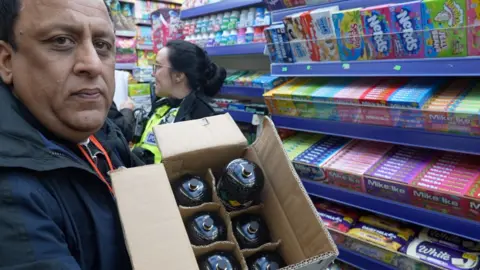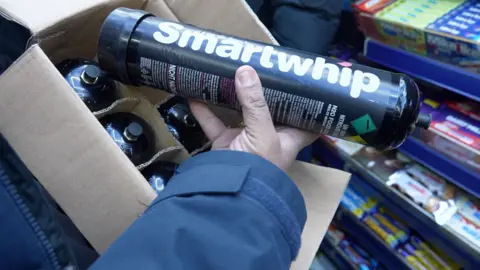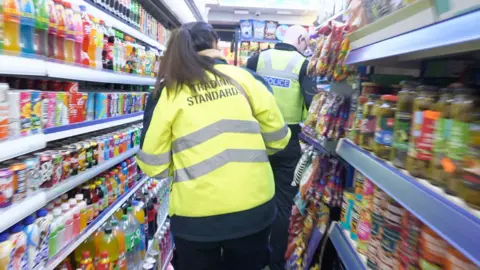Laughing gas sales continue despite ban
 BBC
BBCShops are finding new ways to store and sell laughing gas canisters to "minors and anyone else who wants to buy them", a trading standards officer has said.
Nitrous oxide was categorised as a Class C drug in late 2023, making it a crime to possess or sell it for recreational purposes.
But Mohammed Tariq, a trading standards officer in Birmingham, said some deals had just "gone underground" in the city rather than stopping.
The BBC accompanied Mr Tariq on a raid on a shop in Birmingham, where he found a dozen laughing gas canisters.
"As you can see, today it wasn't in the shop, the associated material was in the shop but the actual canisters were in the side alleyway," he said.
"From intelligence, nitrous is still being supplied - we are not seizing as many, but I just think they've gone underground."
It is estimated that about 290 nitrous oxide canisters have been seized from shops in the city since last September, according to Birmingham City Council's trading standards department.

Before the ban came into force in November 2023, laughing gas was one of the most commonly used recreational drugs by 16 to 24-year-olds and its use had soared during the pandemic.
People are drawn to laughing gas because it is "fashionable" but it is "more harmful than cannabis", said a 25-year-old man from Birmingham who was a former user of the drug.
The man, who did not want to be named, told the BBC he used the drug over a period of weeks but stopped after seeing the impacts on his health.
"It makes you feel like a zombie," he said.

Nitrous oxide can make people feel relaxed and light-headed when inhaled, but it can also cause headaches, fainting, and make some users anxious. Heavy use can lead to a vitamin B12 deficiency that can damage nerves in the spinal cord.
The gas remains legal in some settings – it is commonly used as a painkiller in medicine and dentistry, and it is also used to make whipped cream.
The former user said shops would regularly sell laughing gas canisters to him and people he knew because "they are our friends".
He added: "We would buy it from the shops, they don't say anything because they know us."
In the year ending in March 2024, 0.9% of people aged 16-59 used nitrous oxide, down from 1.3% the previous year, according to the latest data from the Office for National Statistics.
There was a rate of 3.3% amongst those aged 16 to 24, which showed no statistically significant change versus the previous year, although levels were lower compared to a decade earlier.
Follow BBC Birmingham on BBC Sounds, Facebook, X and Instagram.
